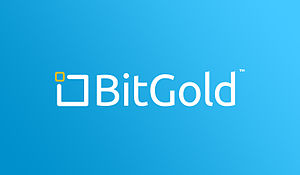BitGold
| Subsidiary | |
| Industry | Financial Services |
| Founders | Roy Sebag Josh Crumb |
| Headquarters | Toronto, Ontario, Canada |
|
Area served
|
Worldwide |
|
Key people
|
Darrell MacMullin (CEO) |
| Products | Payment systems Savings |
| Revenue | |
| Parent | GoldMoney Inc[1] |
| Website | www |
BitGold is a Canadian company offering international savings and payments services which allow people and businesses to send payments and hold savings with physical gold. Its headquarters are in Toronto, Canada.[2]
Contents
History
Early history
Founded in 2014 by Roy Sebag and Josh Crumb, BitGold is the sole operating business of BitGold Inc.[3]
Initial investors in BitGold were Soros Brothers Investment which is run by Alexander Soros, the son of George Soros.[4] On June 16, 2015, BitGold Inc. announced the completion of an additional $21.4 million secondary financing.[5]
On June 26, 2015, BitGold Inc. announced US residents can sign up on the BitGold platform and buy, sell or redeem gold.[6]
On June 30, 2015, BitGold Inc announced former head of PayPal Canada, Darrell MacMullin to be CEO.[7]
On September 4, 2015 BitGold Inc announced the launch of their mobile application on iOS and Android.[8]
On November 28, 2015 BitGold Inc announced the appointment of John Butler to lead the wealth services division. He is well known by writing the "Golden Revolution" in 2012.[9]
GoldMoney Inc acquisition
On May 22, 2015, BitGold Inc. announced the acquisition of GoldMoney Inc and its subsidiaries for a purchase price of $51.9 million, integrating over $1.5 billion in assets and over 135,000 user sign ups into the combined company.[10][11][12]
Corporate headquarters
BitGold’s corporate headquarters is based out of Toronto, Ontario, Canada. BitGold's European headquarters is located in Milan, Italy.
Services
BitGold is currently available in more than eleven languages. BitGold’s services allow people to purchase gold and make financial transactions using the acquired gold between individuals and businesses.[13][14][15] As of 2015, BitGold operates in 166 markets and has 625,000 registered accounts. BitGold allows customers to send, receive, and redeem gold bullion.[16]
Vault accounts are provided to users along with transaction services including cross-border gold payments, merchant invoicing and processing for gold, debit card spending of gold at traditional points of sale, and conversions to a user's external digital wallet.[17]
Regulations
Sebag, the co-founder of BitGold, has stated that he believes BitGold is not a bank because it does not engage in fractional-reserve banking.[18][19]
BitGold is regarded by Financial Transactions and Reports Analysis Centre of Canada (FINTRAC) as a dealer in precious metals and stones.[20] BitGold offers its services under the Canadian Bailment Law.[21]
Safety and Security
BitGold has an arrangement with The Brinks Company to provide access to vaults located in Toronto, London, Zürich, Dubai, Singapore, and Hong Kong. All financial statements are audited by PriceWaterhouse.[22][23]
The BitGold Corporate By-Laws states that any customer transaction that is carried out must be commenced in their segregated subsidiary BitGold Vault Inc. The Corporation is required to buy or sell assayed and stamped .9995 pure or better bullion-grade gold for customers from an approved list in which their gold meets the minimum specification set by the London Bullion Market or New York Mercantile Exchange division Commodity Exchange resulting in the settlement of each metric gram, kilogram or tonne of physical gold. All vaulted gold must maintain adequate insurance coverage for every customer, in which the current insurance provider is "BRINKS".[24] All account holders are allowed upon request real-time "audits" of their physical gold bullion, this is done through the corporation’s patent pending technology "aurum", in which an encrypted digital copy is sent to a third party auditor to conduct the audit at the vault custodian ensuring the reported gold is reconciled through physical inspection.[25]
See also
References
- ↑ Lua error in package.lua at line 80: module 'strict' not found.
- ↑ Lua error in package.lua at line 80: module 'strict' not found.
- ↑ Lua error in package.lua at line 80: module 'strict' not found.
- ↑ Lua error in package.lua at line 80: module 'strict' not found.
- ↑ Lua error in package.lua at line 80: module 'strict' not found.
- ↑ Lua error in package.lua at line 80: module 'strict' not found.
- ↑ Lua error in package.lua at line 80: module 'strict' not found.
- ↑ Lua error in package.lua at line 80: module 'strict' not found.
- ↑ Lua error in package.lua at line 80: module 'strict' not found.
- ↑ Lua error in package.lua at line 80: module 'strict' not found.
- ↑ Lua error in package.lua at line 80: module 'strict' not found.
- ↑ Lua error in package.lua at line 80: module 'strict' not found.
- ↑ Lua error in package.lua at line 80: module 'strict' not found.
- ↑ Lua error in package.lua at line 80: module 'strict' not found.
- ↑ Lua error in package.lua at line 80: module 'strict' not found.
- ↑ Lua error in package.lua at line 80: module 'strict' not found.
- ↑ Lua error in package.lua at line 80: module 'strict' not found.
- ↑ Lua error in package.lua at line 80: module 'strict' not found.
- ↑ Lua error in package.lua at line 80: module 'strict' not found.
- ↑ Lua error in package.lua at line 80: module 'strict' not found.
- ↑ Lua error in package.lua at line 80: module 'strict' not found.
- ↑ Lua error in package.lua at line 80: module 'strict' not found.
- ↑ Lua error in package.lua at line 80: module 'strict' not found.
- ↑ Lua error in package.lua at line 80: module 'strict' not found.
- ↑ Lua error in package.lua at line 80: module 'strict' not found.
